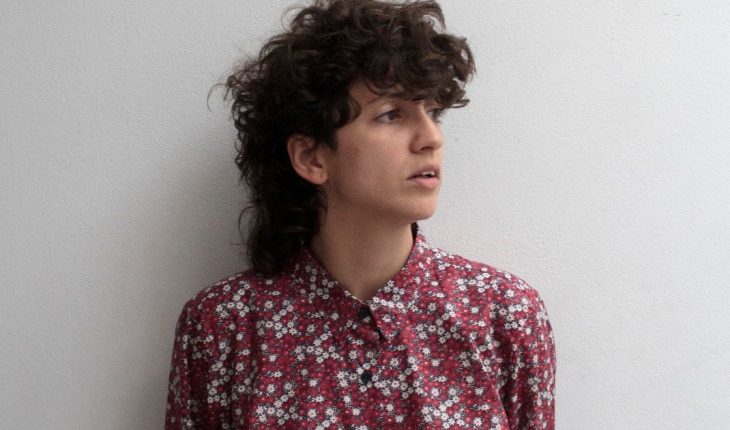On March 20, 2020 Barbi Recanati released her album, ‘Real Time Location’. If we stop in time and space, that day the country went into strict quarantine for an unknown, fast virus. Unknowingly, the artist offered a journey through seven songs that were company and embrace in times when art was more necessary than ever. “The pandemic is half a mess. All chaos. It’s weird not to be making music that long. I live from other things, and at the same time it’s like the record has a life of its own. It was taking on a life of its own through the use that people gave it, making covers of the songs, uploading videos, doing things with the background music, even had video clips that were the initiative of other people”, he reflects, in dialogue with this medium. Music as encounter and salvation in hostile times. For Barbi, also synonymous with revolution. The beginnings of Bárbara Recanati -a.k.a. Barbi- date back to 2005, when he formed the band Utopians with his schoolmate Larry Fus. They released albums such as “Inhuman” (2007), “Vandal” (2014) or “Todos nuestros átomos” (2016), and were the opening act for The Cure at the River Plate Stadium and Guns N’ Roses at the Ciudad de La Plata Stadium. The group came to an end in 2017, after allegations of sexual abuse against guitarist Gustavo Fiocchi became known. It was Barbi who gave him an end, 24 hours later, with a message he posted on his Instagram account: ‘No matter the doubts you always have to stand on the side of the girls,’ he wrote.
Photo: Courtesy of | press PH: Eme Romero
Fiocchi was one of the pieces of a system that was beginning to collapse: under hashtags such as #YoSiTeCreo or #YaNoNosCallamosMás, hundreds of women made public denunciations of artists such as Cristian Aldana or Santiago Aysine. The girl revolution moved mountains, with moves like “Ni Una Menos” or “Time’s Up,” to change the music scene forever. And to Barbi too.” I remember it as another life sometimes. But mostly because of my gaze. Like I was someone else. Sometimes it’s similar to when I remember my adolescence and think of things I felt or said and it gives me like a weird shame. Sometimes I feel that I was a teenager and that adulthood came to me with feminism,” she confesses to this media outlet. In the midst of that social boil, Barbi was the mother of her first child: “I did nothing but be with my son, read and arm myself because I had been weak. When you’re in a world of men, you suddenly feel like you were left alone in the world,” she told Page 12. In 2018 she stepped on stage again, as a guest on a show by Eruca Sativa; but this time, with a solo project. “There was a giant environment of producers, journalists, fellow women, who were not part of my life, and that was where I had to build my habitat,” he continued. That year she presented her first EP, “Teoría Espacial”, produced at the Átomo Studio and composed of four singles, with which she was nominated for the Gardel Awards as “Best New Artist”. ‘you thought that maybe it was good to obey, these times are ours (…) It’s going to fall, it’s going to fall’, he sings in ‘A la luz’, one of his greatest hits.
She was the creator of the record label “Goza Records” with Futurock, a “platform that promotes gender equity in music”, as defined by the singer. Among the main artists who worked on the label are Paula Maffía, Tranki Punki, Blanco Teta, Ruiseñora or Hija de Tigre.” Goza is a platform that promotes gender equity in music. But I don’t see it as a record label. The first year there was a lot of talk about whether or not there were bands that were not cis men, and we recorded 12 albums in 12 months, the second year we mixed and finished recording projects that needed help to finish, we did a tour of meetings of talks and debate with Futurock and British Council, training workshops sponsored by Spotify and the first vinyl of the label compiling the first 12 singles thanks to Laser Disc”, he describes.
Photo: Instagram @gozarecords
He then adds, “Then came the pandemic and we focused on the digital distribution part. I think the spirit of Goza is not to have future projects but to try to connect 100% with the present of the scene and different demands to achieve that equity. Sometimes it doesn’t have to do with what to listen to on the radio or at festivals, but more with accompanying artists to learn how to record their songs, upload their material, put together their tours, or the opposite of wanting to grow an artist, but accompanying the self-managing part and not relying on an industry that accepts you to make art. He also presented his podcast “Mostras del Rock”: “How did rock come about? Quwho founded it? Do you know Rosetta Tharpe, Cordell Jackson and Memphis Minnie? And how much do you know about Aretha Franklin or Carole King?” those are the questions she answers in each episode, with stories of musical heroines who “broke through sexist walls, opened doors, and put together paths that reach the present.” “I ended up with some stories that I didn’t know and that I thought it was important to collect. Then it ended up being like a manifesto about the importance of these stories to the rest of the music. And question why the story that is disclosed and rewritten over and over again, decides to download these other stories so fundamental, “says the artist.
Photo: Courtesy of | press PH: Eme Romero
The project turned into a book: “I thought it was important to summon Powerpaola and make them concrete stories, with comics, drawings, manifestos. A book of those that you want to have on the table and that everyone sees, and sooner or later they know those stories, “he says. If we talk about equality in music, at the end of 2019 the Law of Female Quota in the Stages was approved, which requires a 30% participation of women and dissidents in the grids. Almost two years after that moment, for Barbi “it’s like a giant thing that has to change and started to change out there”: “If we see it as a victory and as something that’s going to change the scene, I think it’s the same as nothing. Diversity is not women or men. And it’s not something that happens at festivals either. But if I think it’s starting something, and sometimes the first steps are the most difficult, and in that sense I celebrate the people who got involved and militarily and made it happen.” In this sense, the new generation of artists who arrived to change the rules stands out. Among them she names Nicki Nicole, who became the first Argentine to appear on The Tonight Show, the most watched show in the United States hosted by Jimmy Fallon. “I’m not very modern. In fact by the age I am quite old musically. But the other day when I saw her on that show I was excited as if it were the final of a World Cup, “confesses the artist. Then she continues: “And I realized that it wasn’t about the musical aspect, but about seeing such a young girl in such a high and large visibility space, seeing the exact moment when millions of kids say ‘I want to do the same as her’, for whatever superficial reason it is. , being on TV, having money, the car, the house, whatever, I find it exciting that those references are diversified … even if it is in a binary and hegemonic way, she is still a 20-year-old girl from Rosario, the first Argentine artist to be on the most watched talk show in the world.”***If we are here and now, this year Barbi returns to the Gardel Awards, nominated in the shortlist “Best alternative rock album” next to “Los Años Futuros” of 1915 , and “Lapsus” by Zero Kill. “It’s always nice to get a compliment to a song or a record. I take the awards as a compliment, far from it,” he says. The album was produced by Juan Manuel Segovia and Tomás Molina Lera, who worked on each track over and over again. “That process of going back and forth with the songs until you get to the audio place you’re looking for, was something new. I had always experienced using audio references, but recording only once, mixing only once and then fixing. I had never tried finishing a track, and saying, ‘no, it was another audio, it’s going again’. I think that was the benefit of recording in our studio, and not putting a release or end date on it,” he adds.
Barbi in a white t-shirt, exchanging glances with a dog sitting next to him. That’s the cover art that illustrates the album; according to him, the original idea was to pay tribute to Grace Jones, by the hand of the photographer Muriel Bruschi, although at the last moment the plans changed. “I was going to be almost unrecognizable. But I always had a weird refusal to fix my hair or face in any way. I do not use cocoa butter. So when it came time to touch me, obviously I started to get weird. At one point I went out in a pump and t-shirt from the bathroom, very moody and frustrated, and Muriel told me, to see you stand next to the bitch, and there is the lid of the disc”, she recalls.
After presenting the album, Barbi ventured into the world of radio, from Monday to Friday on Radio Nacional and Thursday on Futurock. “It’s a very new thing, and it was a year with several personal changes as well. It was a year as a pause to many things and a new beginning to others,” he says. Among them he anticipates that he began to compose again to record material in the future. As he sums it up: “Despite it being a difficult time I’m pretty happy.”
On this note:





